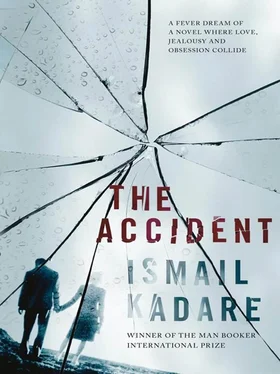The discovery of another diary notebook put an end to the confusion by making sense of the writer’s style and casting light on both the relationship between the Slovak and the beautiful Albanian and the matter of the nightmare, which was not the Slovak student’s, but Besfort’s.
“After that unexpectedly generous night, R. changed,” wrote Janek B. In a few terse words he described his pain, although he avoided using the word “pain” itself, and particularly that other word, “suffering”.
His notes were vague, with phrases often left incomplete, but they still conveyed the distress he had felt the following evening when Rovena had failed to keep her appointment at the bar.
He drank. He tried not to show how he felt in front of others. A few days previously he had said half-jokingly, “We from the East have had our share of suffering. Let us not suffer in love too. Now it’s the turn of you Westerners.”
He thought he saw the retort in the eyes of one of his friends, “My dear Janek, there is suffering under any regime.”
Rovena was different when she came to the university the next day. She explained that someone had arrived from her own country, Albania. Her face was pale, and in her nervous haste she could not concentrate. A mafia type? A trafficker in women? A lover? Janek B. made three guesses about this mysterious visitor. Which was most likely? The newspapers were full of reports of Albanian gangsters. They arrived from their distant country, made threats and then vanished, leaving emptiness and terror behind them.
Janek B. had tactfully broached the subject with Rovena, but she had blinked and failed to understand him. When she had grasped what he was on about, she said no, he had nothing to do with things like that, not with… trafficking… threats…
He wanted to shake her by the shoulders and ask: “What the hell is the matter with you?” But something stopped him. “R. in the bar this evening again. But it’s no go now.” They sat next to each other as before, under the curious gaze of the other students from the East. They were hard people to figure out. Who knows what the dictatorships did to them.
Rovena’s eyes would sparkle cheerfully, only to grow dull and cloud over as she became pensive again. Did she remember that they had slept together? This question haunted Janek. He did not know how to remind her without causing offence. “Yesterday I managed to say to her: ‘Do you remember that beautiful night, when we danced together for the first time and when later…’”
The blood froze in his veins as he waited for her response. Her eyelashes hung long and heavy. She finally looked up to say, “Yes, it was beautiful.” Her voice was soft, neither cold nor tender. She could have been talking about a painting. He mentioned her visitor from far away. Who knows where the subject will lead, he thought. Rovena lowered her eyes, but the question did not seem to annoy her. Emboldened, he pressed on. “Are you always thinking about him?”
He spoke gently, almost in a whisper. When she raised her eyes, not only did she not show any trace of irritation, but her expression was full of gratitude. “How stupid of me not to realise that she didn’t want to talk about anyone else,” wrote Janek.
“I like complicated men,” she said later, after a long silence.
“Complicated in what way?” he asked.
“In every way.”
His earlier suspicions returned. Was this man mixed up in some shady business? Was he dangerous? Plenty of women fell in love with criminals. It had been quite the fashion recently.
Rovena toyed with the ends of her hair like a high-school girl in love. “He is complicated,” she went on, as if talking to herself. Janek was cut to the heart to see her eyes damp with tears. “One night he cried out in his sleep because of a nightmare,” she went on. Janek thought that if shouting in his sleep was the way to improve his standing in the eyes of women, he could shout to bring the house down, but he did not dare say this. He tried to look interested while Rovena told him about this man’s nightmare, the famous one about the summons to The Hague stuck to telegraph poles, bus stops and trees.
“The others who saw us whispering together probably thought – thank God they’ve sorted themselves out.”
A few days later, Janek’s diary entry read: “I’ve made a discovery. To my shame. This shame, strangely, does not bother me. Shame is my meat and drink.”
The Slovak’s extraordinary realisation was that the mysterious visitor, who he thought had robbed him of Rovena, was in fact now bringing her closer to him.
He had acquiesced in what many would call a serious humiliation. He was going out with a woman on condition that he talked about another man!
This condition was of course never made explicit, but he was aware of it. Rovena was obviously impatient as they skimmed through other topics in order to reach “him”. She admitted candidly that they had been together for years. She described their trips together, their hotels, beaches in winter. She never said that they were now facing a crisis, but this too was apparent.
“It’s incredible what has happened! We slept together again,” he wrote in his diary.
Even more incredibly, this changed nothing. In fact, now that she had yielded to him again, it seemed entirely natural that she should claim her due from him without any ill feeling.
“There is no hope now,” he wrote two days later.
He really did not hope for any improvement. Her body would lie next to him, but not the woman herself. Her mind would be elsewhere, just as before, and he would be obliged to pay her price, hour after hour. Willingly or not, he would keep his side of the bargain and listen to her talking about this absent man whom he had every reason to detest.
He hoped that when the crisis passed she would no longer feel the need to unburden herself. He could imagine what would happen next: their pact would break down, and their relationship with it.
And that is what happened. Their meetings grew less frequent and then ceased. He tried to reconcile himself to the situation. Now they were just friends.
“Are you back together again?” he asked her one day.
She nodded yes. He was sustained by the hope that she would go through another crisis which he, to his shame, could turn to his benefit.
Somewhat more relaxed, yet with the bitterness that this new situation brought him, he turned the conversation to the news reports about Albanian gangsters. There had been more of them recently. Rovena shrugged her shoulders dismissively.
Much later, on the terrace of a café, she mentioned Besfort, and the Slovak suddenly asked why he was scared of The Hague.
She had laughed. “Scared of The Hague? I don’t think he is.”
“I meant to say, scared of a journey to The Hague.”
She shook her head. “I would say the opposite. We were going to go there together for pleasure. To visit Holland and see the tulip fields…”
“But The Hague isn’t just a flower garden. More than anything else, it’s a court. It preys on the mind of anyone with an uneasy conscience,” he said.
“Oh, I see what you mean,” she said, frankly showing her irritation. “But I told you, we were going there for pleasure, for the tulips.”
“No, you listen to me,” he said. “He saw a court summons in that dream, not tulip adverts.”
They stared angrily at each other, speechless.
“What do you know about it?” she said icily.
Instead of answering, he held his head in his hands. “I’m sorry,” he said amid sobs. “I’m sorry. I shouldn’t have said that.”
When he took his hands away, she saw that he had really been crying. “I’m disgusting,” he went on in a broken voice. “I’m mad with jealousy. I don’t know what I’m saying.”
Читать дальше












